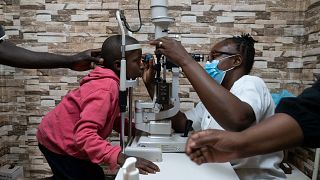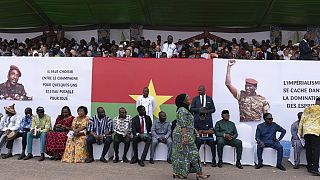Burkina Faso
Burkina Faso strongman Paul-Henri Sandaogo Damiba was ceremonially sworn in as president on Wednesday following the adoption of a "charter" to restore elected government in 2025.
Damiba, a 41-year-old lieutenant-colonel, seized power on January 24, toppling elected president Roch Marc Christian Kabore.
He was sworn in as president and head of the armed forces by the top constitutional body on February 16.
Brief ceremonies to officialize his position were held Wednesday before representatives of the army, political parties and trade unions and the diplomatic corps.
Damiba, dressed in signature camouflage uniform and red beret, did not make a speech.
On Tuesday, Damiba signed a so-called transition charter that declared elections would be held 36 months after his inauguration.
The period was longer than the 30 months that had been proposed by a commission set up by the junta.
The charter stipulates that the president is not eligible for the "presidential, legislative and municipal elections which will be organized to put an end to the transition."
A 71-member legislature and 25-member government led by a civilian prime minister will be set up to ensure the transition.
Their members will also be barred from contesting the post-transition ballot.
One of the poorest countries in the world, the landlocked Sahel state has a long history of volatility since gaining independence from France in 1960.
Regional neighbours Mali and Guinea, have been hit with tough sanctions by the Economic Community of West African States (ECOWAS) for delays in returning to civilian rule after recent military takeovers.
Burkina, like those countries, was suspended from ECOWAS activities after the coup.
But it escaped wider punishment after talks between the junta and envoys from the bloc.
Instead, it was told to provide a "reasonable" timetable "for the return to constitutional order".
Kabore was forced out following a wave of public anger at his handling of a long-running jihadist insurgency.
More than 2,000 people have died since the first attacks in 2015, according to an AFP tally, while the country's emergencies agency says more than 1.5 million people have fled their homes.
Kabore has been under house arrest since his ouster, despite international calls for his release.













01:01
Burkina Faso to dissolve its electoral commission
01:02
Bill granting head of Mali's junta, Gen. Assimi Goita, five more years in power signed into law
01:00
Pix of the Day: July 10, 2025
Go to video
First Malaria treatment for babies approved
01:01
Chad’s former Prime Minister appeals to Macron after two months in detention
00:44
Mali junta chief extends army rule by five years, rules out elections